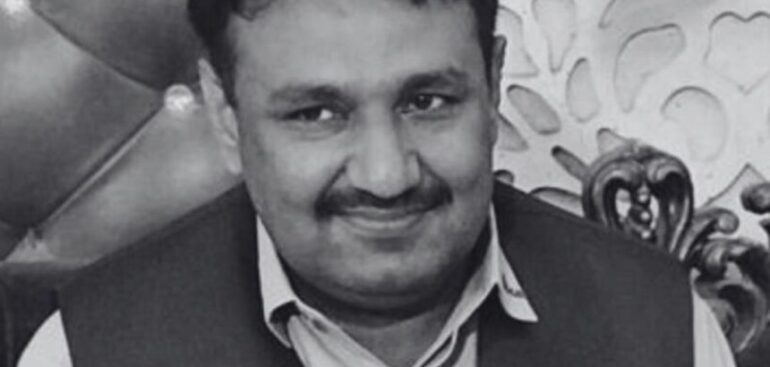On a Friday meant for peace and prayer, the streets of Karachi bore witness to unspeakable horror.
Laeeq Ahmad Cheema, a 46-year-old father, husband, and respected member of Pakistan’s persecuted Ahmadiyya community, was mercilessly lynched in Karachi’s Saddar area. He died on the street, bleeding and broken, long before he could even be helped. His only “crime”—belonging to a faith that dares to pray differently in a nation that has steadily criminalized their existence.
The mob that took his life was not a hidden militia, not an unseen force—no, it was hundreds of men, out in the open, affiliated with the far-right religio-political party Tehreek-e-Labbaik Pakistan (TLP). Their rage wasn’t spontaneous. It was rehearsed, cultivated, and allowed to fester under the indifferent gaze of the state. As they gathered outside the Ahmadi place of worship near Saddar’s auto parts market—just as they’ve done repeatedly on Fridays across Pakistan—violence was never a possibility. It was a plan.
Cheema was merely passing by, phone in hand, reportedly filming the gathering outside the Ahmadi worship site near Hashoo Centre. But someone recognized him. That was all it took. Within moments, he was set upon by dozens of men. They beat him with such savagery that he succumbed before he could be taken to a hospital. No warning. No mercy. No rescue.
This was not a stray moment of madness. This was the continuation of a haunting pattern—a community forced to live in the shadows, their worship criminalized, their identities marked, their graves desecrated, their voices silenced.
A Siege on Faith
That day, at least 400 TLP supporters had surrounded the Ahmadiyya Hall on Abdullah Haroon Road. Inside, around 40 members of the community sat terrified, trapped, waiting for either salvation or slaughter. Deputy Inspector General Syed Asad Raza admitted that security forces had already been deployed in the area, aware of past attacks on Ahmadis in Karachi’s Shah Latif, Surjani, and Khokhrapar areas. Yet, even with this foresight, Cheema’s life could not be protected.
According to Station House Officer Shabbir Husain, it was only after the lynching that the police moved the worshippers to safety using a prison van. The irony is unbearable: the victims were herded into the same vehicle used for criminals—perhaps because, in today’s Pakistan, that is how Ahmadis are seen.
Amir Mehmood, a spokesperson for the Ahmadiyya community, did not mince words. “Open calls for our murder are being made,” he said. “And still, it is our gravestones being smashed, our places of prayer razed, our people arrested—for praying, for breathing, for existing.”
Indeed, the Ahmadiyya Hall in Karachi had already been attacked twice in recent memory—on February 2nd and September 4th, 2023. In both incidents, the attackers demolished religious symbols, spurred on by the same hateful ideology that eventually ended Cheema’s life.
The Constitution Betrayed
Pakistan’s Constitution, in Article 20, claims to guarantee the religious freedom of all citizens. But for Ahmadis, this guarantee rings hollow. When violent mobs roam freely, protected by political patronage and police inaction, when the justice system punishes the victims rather than the perpetrators, what worth does any constitutional promise hold?
The Human Rights Commission of Pakistan (HRCP) recently issued a report titled “Under Siege: Freedom of Religion or Belief in 2023-24.” Its findings were damning—blasphemy laws being increasingly weaponized against Ahmadis, arbitrary arrests, and targeted killings. Of the four faith-based murders they documented last year, three were Ahmadis.
Let that sink in.
Three people killed, just for believing differently.
Four hundred people gathered to surround a prayer hall—not to worship, not to express dissent peacefully—but to threaten, to intimidate, and to ultimately kill. And still, no meaningful action has been taken.
A Nation at the Crossroads
How many more Laeeq Cheemas must die before we confront the rot that is hollowing out Pakistan from within?
To be Ahmadi in Pakistan today is to be hunted—by mobs, by media, by the very institutions meant to uphold justice. But to be silent about it is to be complicit. Every death like Laeeq’s is not just a personal tragedy—it is a national disgrace, a tear in the fabric of our shared humanity.
Justice for Laeeq Cheema is not just about punishment for his killers. It’s about breaking the cycle of hatred that led to his death. It’s about upholding the promise of equal rights. It’s about choosing, finally, to stand with the persecuted instead of the persecutors.
Until then, Laeeq’s blood remains not only on the hands of the mob—but on the conscience of an entire nation.
